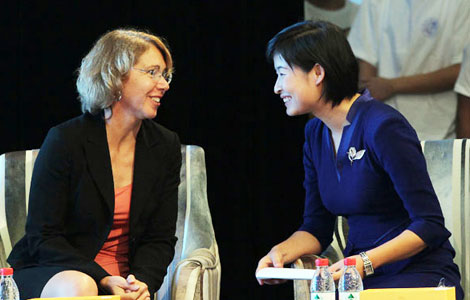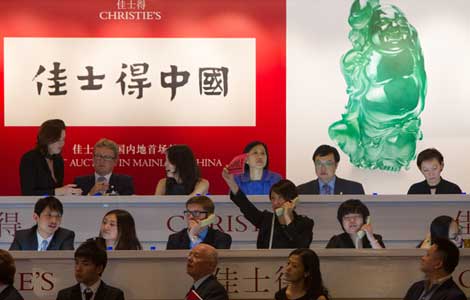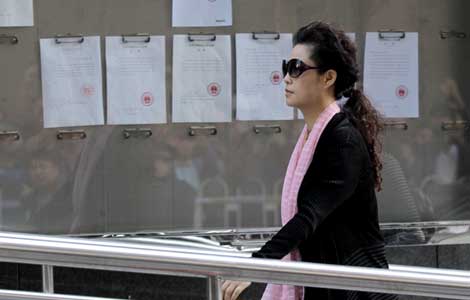Can the 'Asian pivot' be saved?
Updated: 2013-09-27 11:47
By Ryan Allen (China Daily)
|
||||||||
On Sept 24, when US President Barack Obama gave his speech in front of the United Nations, he caused a buzz not by what he said, but by what he failed to mention.
During his speech, Obama mentioned China once, and the Koreas, Japan, and India zero times, noted most prominently by Ian Bremmer, president of the Eurasia Group.
This encapsulates US foreign policy over the past few years. The rhetoric coming from the Obama administration has been for a "pivot to Asia" - this meaning that the US will put an added emphasis on not just China, but the entire region.
However, despite the so-called Asian Century, predicted to become the economic and political focal point for the world, American policy in Asia has basically remained status quo.
The US remains bogged down in the Middle East, which has monopolized the attention of US foreign policy for two decades now.
But the pivot to Asia does not have to die. It can and should be salvaged through public diplomacy efforts, cultural exchanges, and international education initiatives.
Already the Obama administration has attempted to jump-start these sorts of efforts. In his first term in office, he announced the 100,000 Strong initiative, "A national effort designed to increase dramatically the number and diversify the composition of American students studying in China", according to the State Department.
Because of cost cutting in Washington, funding for the initiative never materialized. But a private foundation was created to serve the initial purpose.
With backing from the Ford Foundation, the blessing of Hillary Clinton, and partnerships among top Chinese educational NGOs (Asia Society and China Institute), the organization is functioning and facilitating its original vision.
This, unfortunately, is not enough.
While the US has seen a growth in students studying in China and the rest of Asia, the region has been supercharging the international student market in American educational institutions.
Of the top 10 countries that export international students to the US, six of them are Asian and half of those are the top three. China is number one with almost 194,029; India is second with 100,270; and South Korea is third with 72,295, according to the Institute of International Education (IIE) Open Doors Data.
In reciprocation, the US sends only a fraction of its students to these countries - only 14,596 to China; 4,345 to India; and 2,487 to South Korea, according to the IIE's data.
The US needs to invest more into these exchange efforts in the region. This cannot simply come from private donors. The American people and its leaders must take some responsibility for its foreign policy efforts.
The government should be supercharging the Fulbright Program, the premier governmental cultural exchange tool of the US government, for scholarly exchanges in the region. But, the organization has only seen cuts recently.
The government should also be ramping up its efforts in language education. The State Department's Critical Language Scholarship Program should be flooded with participants and funding for Mandarin, Korean, Hindi, and other Asian languages.
The states should also take a role. Each state should be investing in meaningful exchanges with China and the other Asian countries. As of now, it seems that the Chinese government-funded Confucius Institutes are the only organizations penetrating a large portion of America. The state governments should see this as an opportunity to expand their role in international education.
The pivot to Asia might be over in regards to its original intent, but it does not have to end overall. The path of public diplomacy is actually a better investment than military expansion.
The 100,000 Strong Foundation cannot save the pivot on its own. The president, Congress, and the American people need to empower this movement of public diplomacy, much like the expansion of global scholar exchanges after World War II.
Will the Obama administration pursue this route? Perhaps. But a better question is whether the America people will accept this kind of investment. Unfortunately, they probably will not.
Ryan Allen is an adjunct lecturer at Berkeley College and a communication specialist at American International Education Development Council
(China Daily USA 09/27/2013 page16)

 Serena Williams back to Beijing for new crown
Serena Williams back to Beijing for new crown
 'Battle of the sexes' to start China Open
'Battle of the sexes' to start China Open
 US astronaut praises China's space program
US astronaut praises China's space program
 Christie's holds inaugural auction
Christie's holds inaugural auction
 Aviation gains from exchanges
Aviation gains from exchanges
 Early fish ancestor found
Early fish ancestor found
 Singers' son sentenced to 10 years for rape
Singers' son sentenced to 10 years for rape
 Djokovic announces engagement to girlfriend
Djokovic announces engagement to girlfriend
Most Viewed
Editor's Picks

|

|

|

|

|

|
Today's Top News
Trending news across China
Overseas entrepreneurs connect with reform
Russia to guard Syria chemical weapon destruction
Interpol issues arrest notice for 'white widow'
US astronaut praises China's space program
Wang, Kerry meet second time
China to join talks on trade in services
Philippines-US drill raises concern
US Weekly

|

|






